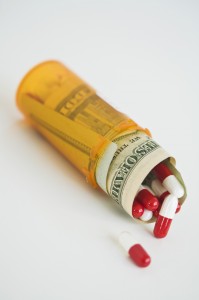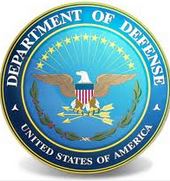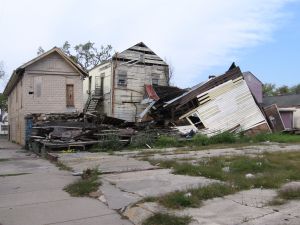 Yesterday, a federal judge in Illinois refused to dismiss the majority of a relator’s allegations brought under the False Claims Act against Northrop Grumman Corporation (“Northrop”). The complaint alleges that the global security company and one of the largest defense contractors in the world defrauded the federal government in connection with a program designed to create technology to protect commercial aircraft from missile attacks. The program was initiated after two shoulder-fired missiles almost hit an Israeli commercial airline taking off from Kenya. The Counter-Man Portable Air Defense System Development and Demonstration Program (“Counter-MANPADS”) would allegedly be used to as a way to protect civilian airplanes from terrorist attacks. But, under its “best efforts” contract with the government, Northrop allegedly fraudulently represented that it was doing its best to complete tasks in order to falsely collect payments for project milestones.
Yesterday, a federal judge in Illinois refused to dismiss the majority of a relator’s allegations brought under the False Claims Act against Northrop Grumman Corporation (“Northrop”). The complaint alleges that the global security company and one of the largest defense contractors in the world defrauded the federal government in connection with a program designed to create technology to protect commercial aircraft from missile attacks. The program was initiated after two shoulder-fired missiles almost hit an Israeli commercial airline taking off from Kenya. The Counter-Man Portable Air Defense System Development and Demonstration Program (“Counter-MANPADS”) would allegedly be used to as a way to protect civilian airplanes from terrorist attacks. But, under its “best efforts” contract with the government, Northrop allegedly fraudulently represented that it was doing its best to complete tasks in order to falsely collect payments for project milestones.
DaVita Enters into False Claims Act Settlement Totaling $400 Million
 The U.S. Department of Justice announced today that DaVita Healthcare Partners, Inc. (“DaVita”) has agreed to pay nearly $400 million to resolve allegations that it violated the False Claims Act by paying kickbacks to induce the referral of patients to its dialysis clinics. DaVita is headquartered in Denver, Colorado and is one of the leading providers of dialysis services in the United States with dialysis clinics across 46 states and the District of Columbia. DaVita had allegedly identified physicians or physician groups that had significant patient populations suffering from renal disease and offered them lucrative opportunities to partner with the company by acquiring or selling an interest in the dialysis clinics to which their patients would be referred to for treatment. DaVita also allegedly ensured referrals of these patients to the clinics using a series of secondary agreements with the physicians.
The U.S. Department of Justice announced today that DaVita Healthcare Partners, Inc. (“DaVita”) has agreed to pay nearly $400 million to resolve allegations that it violated the False Claims Act by paying kickbacks to induce the referral of patients to its dialysis clinics. DaVita is headquartered in Denver, Colorado and is one of the leading providers of dialysis services in the United States with dialysis clinics across 46 states and the District of Columbia. DaVita had allegedly identified physicians or physician groups that had significant patient populations suffering from renal disease and offered them lucrative opportunities to partner with the company by acquiring or selling an interest in the dialysis clinics to which their patients would be referred to for treatment. DaVita also allegedly ensured referrals of these patients to the clinics using a series of secondary agreements with the physicians.
Trinity Industries in Court Over Allegedly Shoddy Guard Rails Used All Over the U.S.
 On Monday, the False Claims Act trial against Trinity Industries (“Trinity”) was scheduled to restart in federal court in Texas after a mistrial was declared in July, attributed in part to the judge’s “serious concerns” over a company official’s truthfulness while under oath. The case was initiated on behalf of the government in 2012 by relator Joshua Harman, who is alleging that the Texas-based company failed to disclose to the Federal Highway Administration that it made a small change in the design of the guardrails that it sells to state highway departments across the United States. This failure to receive pre-approval has allegedly led to Trinity’s fraudulent receipt of hundreds of millions of dollars in reimbursements, predicating liability under the False Claims Act. According to the company’s 2013 annual report, its sales of highway products, including guardrails, amounted to $336 million. If liable, Trinity could be forced to pay close to $1 billion in damages and penalties.
On Monday, the False Claims Act trial against Trinity Industries (“Trinity”) was scheduled to restart in federal court in Texas after a mistrial was declared in July, attributed in part to the judge’s “serious concerns” over a company official’s truthfulness while under oath. The case was initiated on behalf of the government in 2012 by relator Joshua Harman, who is alleging that the Texas-based company failed to disclose to the Federal Highway Administration that it made a small change in the design of the guardrails that it sells to state highway departments across the United States. This failure to receive pre-approval has allegedly led to Trinity’s fraudulent receipt of hundreds of millions of dollars in reimbursements, predicating liability under the False Claims Act. According to the company’s 2013 annual report, its sales of highway products, including guardrails, amounted to $336 million. If liable, Trinity could be forced to pay close to $1 billion in damages and penalties.
Boeing Pays $23 Million to Settle Allegations that it Overbilled the U.S. Air Force
 The U.S. Department of Justice announced on Friday that the Boeing Company (“Boeing”) has agreed to pay $23 million to the federal government to settle allegations made by a number of relators that the aerospace and defense industry giant submitted false claims for labor charges in connection with its contracts with the U.S. Air Force to maintain, repair, and modify the C-17 Globemaster aircraft. Boeing is the world’s largest combined manufacturer of commercial jetliners and military aircraft and the world’s second largest defense company. The C-17 Globemaster aircraft, which is both manufactured and maintained by Boeing, is one of the military’s major systems for transporting troops and cargo throughout the world. The whistleblowers will collectively receive $3.9 million for their role in the litigation. The settlement came as a result of the unsealing of the complaint and the government’s election to intervene in the case. Continue reading ›
The U.S. Department of Justice announced on Friday that the Boeing Company (“Boeing”) has agreed to pay $23 million to the federal government to settle allegations made by a number of relators that the aerospace and defense industry giant submitted false claims for labor charges in connection with its contracts with the U.S. Air Force to maintain, repair, and modify the C-17 Globemaster aircraft. Boeing is the world’s largest combined manufacturer of commercial jetliners and military aircraft and the world’s second largest defense company. The C-17 Globemaster aircraft, which is both manufactured and maintained by Boeing, is one of the military’s major systems for transporting troops and cargo throughout the world. The whistleblowers will collectively receive $3.9 million for their role in the litigation. The settlement came as a result of the unsealing of the complaint and the government’s election to intervene in the case. Continue reading ›
Pharmaceutical Companies Continue to Battle False Claims Act Case Involving Abilify
 This week, Bristol-Myers Squibb Co. (“BMS”) and Otsuka America Pharmaceutical Inc. (“Otsuka”) asked a federal court judge in Ohio to dismiss a complaint filed against them by two relators that alleges that the pharmaceutical companies offered illegal kickbacks to physicians in order to induce them to promote off-label uses of the antipsychotic drug Abilify. Induced prescriptions for off-label uses are not eligible for reimbursement by government health care programs. The kickbacks allegedly violated the Anti-Kickback Statute. Both allegations predicate liability under the False Claims Act. Two former sales representatives employed by BMS are specifically alleging that, beginning in 2005, the companies engaged in a nationwide scheme to fraudulently promote Abilify to doctors of pediatric and geriatric patients. Aripiprazole, marketed jointly by BMS and Otsuka as Abilify, generated sales of over $6 billion in 2013. Such sales make it one of the highest-grossing prescription drugs worldwide. Continue reading ›
This week, Bristol-Myers Squibb Co. (“BMS”) and Otsuka America Pharmaceutical Inc. (“Otsuka”) asked a federal court judge in Ohio to dismiss a complaint filed against them by two relators that alleges that the pharmaceutical companies offered illegal kickbacks to physicians in order to induce them to promote off-label uses of the antipsychotic drug Abilify. Induced prescriptions for off-label uses are not eligible for reimbursement by government health care programs. The kickbacks allegedly violated the Anti-Kickback Statute. Both allegations predicate liability under the False Claims Act. Two former sales representatives employed by BMS are specifically alleging that, beginning in 2005, the companies engaged in a nationwide scheme to fraudulently promote Abilify to doctors of pediatric and geriatric patients. Aripiprazole, marketed jointly by BMS and Otsuka as Abilify, generated sales of over $6 billion in 2013. Such sales make it one of the highest-grossing prescription drugs worldwide. Continue reading ›
Defense Contractors to Repay Government Close to $20 Million for Alleged Fraud
 The U.S. Department of Justice announced yesterday that defense contractor DRS Technical Services Inc. (“DRS”) has agreed to pay $13.7 million to settle allegations that it violated the False Claims Act by overbilling the government for work performed by employees who in fact lacked the requisite job qualifications outlined in its contracts with the U.S. Army and the U.S. Coast Guard. The Herndon, Virginia-based company designs, integrates, operates, and maintains satellite and wireless network solutions, telecommunication services, and security systems for both government and private sector customers. An indirect subsidiary of DRS, Gaithersburg, Maryland-based DRS C3 & Aviation Company provides services to government agencies, including: aircraft maintenance, logistics support, depot support, and engineering support. For ten years, DRS and its predecessors were awarded time and materials contracts for services and supplies to be provided to the Army’s Communication and Electronics Command (CECOM) in Iraq and Afghanistan, and to the Coast Guard for aircraft maintenance. Continue reading ›
The U.S. Department of Justice announced yesterday that defense contractor DRS Technical Services Inc. (“DRS”) has agreed to pay $13.7 million to settle allegations that it violated the False Claims Act by overbilling the government for work performed by employees who in fact lacked the requisite job qualifications outlined in its contracts with the U.S. Army and the U.S. Coast Guard. The Herndon, Virginia-based company designs, integrates, operates, and maintains satellite and wireless network solutions, telecommunication services, and security systems for both government and private sector customers. An indirect subsidiary of DRS, Gaithersburg, Maryland-based DRS C3 & Aviation Company provides services to government agencies, including: aircraft maintenance, logistics support, depot support, and engineering support. For ten years, DRS and its predecessors were awarded time and materials contracts for services and supplies to be provided to the Army’s Communication and Electronics Command (CECOM) in Iraq and Afghanistan, and to the Coast Guard for aircraft maintenance. Continue reading ›
Qui Tam Complaint Survives UChicago Argonne’s Motion to Dismiss
Last week, a federal judge in Illinois retained the majority of a relator’s allegations in a complaint filed under the False Claims Act against UChicago Argonne LLC after the company sought to dismiss the case. Originally filed in 2012 and unsealed in December 2013, the complaint details how the research lab, managed and operated by UChicago Argonne, engaged in an elaborate scheme to defraud the government by overcharging it for work done under federally-funded contracts for agencies. These agencies included the U.S. Department of Defense, the U.S. Department of Energy (“DOE”), and the U.S. Department of Transportation. UChicago Argonne is the prime contractor for Argonne National Laboratory. The laboratory employs more than 12,000 scientists and engineers who perform nuclear engineering, basic energy science, biological and environmental research, hard x-ray science, high energy physics, and computational and technological research at a facility outside Chicago. Continue reading ›
Shire Pharmaceuticals to Pay $56.6 Million After Making Bogus Claims to Market its Drugs
 The U.S. Department of Justice announced last week that Shire Pharmaceuticals LLC (“Shire”) has agreed to pay $56.5 million to settle allegations brought by several whistleblowers that it violated the False Claims Act. At issue was the Pennsylvania-based company’s improper marketing, promotion, and distribution of Adderall XR, Vyvanse, and Daytrana approved by the U.S. Food and Drug Administration (“FDA”) for the treatment of attention deficit hyperactive disorder (“ADHD”) and Pentasa and Lialda, approved by the FDA for the treatment of mild to moderate active ulcerative colitis. Although the uses for the drugs may be considered diverse, the company had allegedly made a number of claims to prescribers involving the appropriateness and benefits of the drugs without any corresponding supporting data. Former Shire executive Gerardo Torres filed the first of two qui tam complaints in a federal court in Pennsylvania in 2008 while three former Shire sales representatives filed the second in a federal court in Illinois in 2009.
The U.S. Department of Justice announced last week that Shire Pharmaceuticals LLC (“Shire”) has agreed to pay $56.5 million to settle allegations brought by several whistleblowers that it violated the False Claims Act. At issue was the Pennsylvania-based company’s improper marketing, promotion, and distribution of Adderall XR, Vyvanse, and Daytrana approved by the U.S. Food and Drug Administration (“FDA”) for the treatment of attention deficit hyperactive disorder (“ADHD”) and Pentasa and Lialda, approved by the FDA for the treatment of mild to moderate active ulcerative colitis. Although the uses for the drugs may be considered diverse, the company had allegedly made a number of claims to prescribers involving the appropriateness and benefits of the drugs without any corresponding supporting data. Former Shire executive Gerardo Torres filed the first of two qui tam complaints in a federal court in Pennsylvania in 2008 while three former Shire sales representatives filed the second in a federal court in Illinois in 2009.
Natural Disaster Fraud Involving FEMA
 Any large influx of federal aid associated with disaster relief presents the potential for fraud. Fortunately, whistleblowers who report these abuses under the False Claims Act stand to share in between 15% and 30% of the government’s recovery. After a natural disaster, the federal government, through the Federal Emergency Management Agency (FEMA), contracts with private companies to provide the affected communities with food, water, shelter, clothing, cleanup, etc. In addition, FEMA administers national insurance policies for those that live in flood prone areas. The need to act quickly combined with a lack of government oversight often results in the submission of fraudulent payment claims to the federal government, especially in large disasters. Examples of potential natural disaster fraud include:
Any large influx of federal aid associated with disaster relief presents the potential for fraud. Fortunately, whistleblowers who report these abuses under the False Claims Act stand to share in between 15% and 30% of the government’s recovery. After a natural disaster, the federal government, through the Federal Emergency Management Agency (FEMA), contracts with private companies to provide the affected communities with food, water, shelter, clothing, cleanup, etc. In addition, FEMA administers national insurance policies for those that live in flood prone areas. The need to act quickly combined with a lack of government oversight often results in the submission of fraudulent payment claims to the federal government, especially in large disasters. Examples of potential natural disaster fraud include:
- Receiving federal funding for services not rendered or goods not provided
- Receiving or providing kick-backs or other benefits in awarding government funding
- Receiving federal funds for expenses paid for by another source
- Inflating the cost of goods and services paid for by federal funding
- Misclassifying expenses or falsifying records to justify federal aid
- Collusion or price fixing schemes in connection with bidding on federal contracts; or
- Using federal funds for personal or other non-qualifying uses
Abbott Laboratories Settles Alleged Violation of the Anti-Kickback Statute for $5.4 Million
 On Friday, the U.S. Department of Justice announced that Illinois-based global pharmaceutical and health care products company Abbott Laboratories (“Abbott”) has agreed to pay $5.4 million to settle a whistleblower’s allegations that it violated the False Claims Act by paying illegal kickbacks to doctors in order to induce them to implant the company’s carotid, biliary and peripheral vascular products.
On Friday, the U.S. Department of Justice announced that Illinois-based global pharmaceutical and health care products company Abbott Laboratories (“Abbott”) has agreed to pay $5.4 million to settle a whistleblower’s allegations that it violated the False Claims Act by paying illegal kickbacks to doctors in order to induce them to implant the company’s carotid, biliary and peripheral vascular products.
United States ex rel. Peters et al. v. Abbott Laboratories, Inc. was filed by former Abbott employees Steven Peters and Douglas Gray and specifically alleged that the company violated the Anti-Kickback Act by paying prominent, well-known physicians for teaching assignments, speaking engagements, and conferences with the underlying expectation that these physicians would then arrange for the hospitals with which they were affiliated to purchase Abbott’s carotid, biliary and peripheral vascular products. Carotid and peripheral vascular products are used to treat circulatory disorders by increasing blood flow to the head and various parts of the body while biliary products are used to treat obstructions that occur in the bile ducts.
The qui tam provisions of the False Claims Act allow private parties to bring suit on behalf of the government and is a powerful tool for uncovering fraud. A successful suit entitles the whistleblower, also known as a relator, to between 15% and 30% of any final judgment or settlement. As part of the settlement reached in this case, Peters and Gray will receive a total payment of more than $1 million. Dating back to 1863, the False Claims Act has enabled relators with direct and independent knowledge of fraud by hospitals, health care facilities, health care providers, medical device manufacturers, and pharmaceutical companies to help recover taxpayer dollars. The statute also provides relators with considerable protection from employer retaliation. The government’s total recovery under the False Claims Act since January 2009 has amounted to $17 billion. Of this total, $12.2 billion was recovered from cases involving fraud on government health care programs.
 Whistleblower Attorneys Blog
Whistleblower Attorneys Blog




